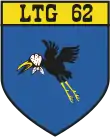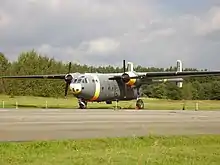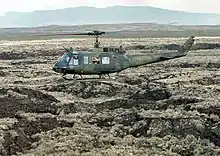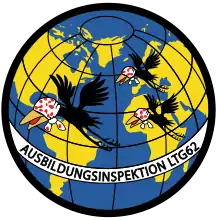| Air Transport Wing 62 | |
|---|---|
| Lufttransportgeschwader 62 (LTG 62) | |
 | |
| Active | 1959–1971 1978–present |
| Country | |
| Branch | |
| Type | Wing |
| Role | Strategic and tactical transport |
| Size | 35 aircraft (40 planned) |
| Part of | Air Force Troop Command Luftwaffentruppenkommando (LwTrKdo) |
| Garrison/HQ | Wunstorf Air Base |
| March | Fliegermarsch |
| Decorations | Lower Saxony (1985) Federal Republic of Germany (1997) |
| Commanders | |
| Current commander | Colonel Christian John |
| Insignia | |
| APP-6A symbol |  |
| Aircraft flown | |
| Transport | Airbus A400M |


Air Transport Wing 62 (German: Lufttransportgeschwader 62) is a wing of the German Air Force (Luftwaffe). The wing was founded in 1959 and is currently based at Wunstorf Air Base in Lower-Saxony, Germany operating Airbus A400M fixed-wing aircraft. Air Transport Wing 62 is subordinate to Air Force Troop Command which in turn is subordinate to Air Force Command. Operational command rests, however, with European Air Transport Command.
Although the wing's main task is tactical air transport, it has been widely employed in various humanitarian aid missions since 1960.
Tasks
The tasks of Air Transport Wing 62 are twofold:
- Global tactical air transport of personnel and equipment from Wunstorf Air Base
- Training of German and French Airbus A400M crews at Wunstorf Air Base[1]

Structure
Air Transport Wing 62 consist of two groups including several flying and non-flying squadrons.
- Staff
- Flying Group
- 1. Flying Squadron (designated for strategic air transport)
- 2. Flying Squadron (designated for tactical air transport and aerial refueling)[2]
- 3. Flying Squadron (designated for special operations or evacuations)[3]
- 4. Flying Squadron, based at Bremen Airport, carries out flight training in cooperation with Lufthansa Aviation Training
- Flight Operations Squadron
- Technical Group
- Two technical squadrons
- Supply Transport Squadron
- Training Workshop
- Training Inspectorate
Equipment
Currently, Air Transport Wing 62 flies the following aircraft:
Aircraft formerly flown by Air Transport Wing 62 include:

History
Air Transport Wing 62 was founded on 1 October 1959. Originally based at Celle Air Base, it was redeployed to Cologne-Wahn Air Base in November of that year. In January 1960, the wing began to receive Nord Noratlas aircraft, 18 of which were eventually delivered.[4] Two months later, in March 1960, Air Transport Wing 62 flew its first mission when it was employed to fly supplies to Morocco in the wake of the Agadir earthquake during the first foreign mission of the newly founded German Armed Forces.[5]
In March 1963, all squadrons of Air Transport Wing 62 relocated to Ahlhorn Air Base except No 3 Squadron which remained at Cologne-Wahn Air Base and became part of the Special Air Mission Wing of the German Ministry of Defence.[4] Twelve Noratlas of Air Transport Wing 62 and Air Transport Wing 63 flew humanitarian aid missions to Algeria, following an earthquake in 1965.[6] The first Transall C-160s were delivered in April 1968.[4]
Air Transport Wing 62 was disbanded in September 1971 but was re-established in October 1978 when Pilot Training School "S" at Wunstorf Air Base was reclassified as Air Transport Wing 62. Following the 1983–1985 famine in Ethiopia, the wing flew 1,859 humanitarian aid missions in Ethiopia and Sudan from March until September 1985.[7] During the Gulf War Air Transport Wing 62 assisted the coalition forces by providing logistic support.[8] It also flew missions to provide humanitarian aid to Kurdish refugees in northern Iraq and Turkey in 1990.[9]
From July 1992 until March 1995, Air Transport Wing 62 provided logistic support to UNPROFOR, the United Nations protection and peacekeeping force during the Yugoslav Wars, and flew supply missions into the besieged city of Sarajevo.[5]
After the German reunification in 1990, the wings of the former East German Air Force were integrated into the German Armed Forces (Bundeswehr). To this effect new wings, now under the command of the Luftwaffe, were created. One such wing was Air Transport Wing 65 based at Brandenburg-Briest Air Base and flying Mil Mi-8 helicopters. This wing was disbanded in January 1993 and reformed as an air transport detachment. This detachment subsequently became subordinate to Air Transport Wing 62. In September 1993, Helicopter Transport Wing 64, based at Ahlhorn Air Base, was also disbanded, and 35 Bell UH-1D helicopters were integrated into Air Transport Wing 62.[10]


The wing took over Holzdorf Air Base in January 1994 where a squadron of the former Helicopter Transport Wing 64 and other airforce units, formerly based at Brandenburg-Briest Air Base, were stationed. They formed Air Transport Detachment of Air Transport Wing 62. This detachment was responsible for air transport missions within the SAR commands at Holzdorf and Erfurt, as well as the emergency services centre at Neustrelitz. In the following years, these helicopters took part in several SAR missions both within Germany as well as abroad, notably during the 1997 Central European flood and the 2002 European floods.[11]
Between 1996 and 2004, Air Transport Wing 62 was part of SFOR, the NATO-led multinational peacekeeping force deployed to Bosnia and Herzegovina after the Bosnian war and continues to support KFOR, the NATO mission to establish a secure environment in Kosovo.[7] During the 2000 Mozambique flood, Air Transport Wing 62 was employed to fly supplies into affected areas of the country.[9]
Since February 2002 Air Transport Wing 62 has operated from an air base at Termez in Uzbekistan, in conjunction with Air Transport Wing 61. The airbase is the main support base for German forces operating with ISAF in Afghanistan.[4]
In 2003, the wing took part in Operation Artemis, a European Union-led military mission to the Democratic Republic of the Congo in support of MONUC, the United Nations mission to stabilise the country.[12]
In November 2004, plans by the Federal Ministry of Defence were released to replace the wing's Transall C-130s and Bell UH-1Ds, with Airbus A400M[13] and NHIndustries NH90.[14] According to the original planning, the Airbus A400AM should have been brought into service within a few years. However, due to technical problems the first aircraft of the new type were expected to enter service not before November 2014.[15] Air Transport Wing 62 will be the only wing within the German Air Force to fly the Airbus A400M.[16]
On 1 October 2010, the helicopter detachment based at Holzdorf Air Base was disbanded and re-established as Helicopter Wing 64. Since then, Air Transport Wing 62 has only operated fixed-wing aircraft.[17]
Over the period 22–26 February 2011 Air Transport Wing 62 took part in Operation Pegasus, evacuating foreign nationals during the Libyan Civil War, during which they were credited with rescuing 262 persons.[18]
The first aircraft Airbus A400M entered service with Air Transport Wing 62 on 19 December 2014.[19] The last Transall left Wunstorf in July 2015.[1] By December 2019 Air Transport Wing operated 31 Airbus A400M.[20]
Accidents and incidents
- On 11 May 1990, while on a low-level training flight a Transall C-160 crashed near Rodenbach[21] in the German state of Hesse due to poor visibility. All ten occupants were killed.[22]
- Whilst approaching Sarajevo International Airport during the Bosnian War a Transall C-160 came under anti-aircraft fire on 5 February 1993, severely injuring Sergeant Wilhelm Wiegel.[23]
Coat of arms
The coat of arms used by Air Transport Wing 62 originally belonged to Pilot Training School "S" but was adopted by the wing when it took off over the school ïn 1971. It depicts a blindfolded raven in flight on a shield held in azure. The azure represents the medium of the air in which the wing operates. The raven is an adaption of the cartoon character "Hans Huckebein" by the influential German caricaturist and painter Wilhelm Busch who was born close to Wunstorf Air Base in nearby Wiedensahl, also used for the designation of Focke-Wulf's never built, 1945-era Ta 183 jet fighter concept. Choosing "Hans Huckebein" for its coat of arms, the wing manifests its attachment and commitment to Wunstorf. The blindfold symbolises the fact that Air Transport Wing 62 carries out instrument training for instrument flights on fixed-wing aircraft.[24]
References
- 1 2 "Der Auftrag", Das Lufttransportgeschwader 62 (in German), Federal Ministry of Defence, 28 August 2015, retrieved 3 January 2016
- ↑ Führungswechsel in der 2.Fliegenden Staffel des Lufttransportgeschwaders 62 (in German), Federal Ministry of Defence, 8 January 2019, retrieved 26 January 2016
- ↑ A400M-Staffel für spezielle Operationen (in German), Federal Ministry of Defence, 8 January 2019, retrieved 26 January 2016
- 1 2 3 4 "Geschichte", Das Lufttransportgeschwader 62 (in German), Federal Ministry of Defence, 7 August 2012, retrieved 10 March 2013
- 1 2 "Die Bundeswehr an der Katastrophenfront". Abgeschlossene Einsätze (in German). Federal Ministry of Defence. 7 August 2012. Retrieved 9 March 2013.
- ↑ "Hilfseinsatz in Algerien", Geschichte der Luftwaffe – Die Jahre 1960 bis 1969 (in German), Federal Ministry of Defence, 7 August 2012, retrieved 11 March 2013
- 1 2 "Die Lufttransportgeschwader – Rückgrat der Luftwaffe", Das Lufttransportgeschwader 62 – Nachrichtenarchiev (in German), Federal Ministry of Defence, 7 August 2012, retrieved 10 March 2013
- ↑ "Das Lufttransportgeschwader 62 ist weltweit ein Begriff 40 Jahre Transall C-160 – Jubiläumsfeier auf dem Fliegerhorst / Rückblick auf Einsätze", Wunstorfer Stadtanzeiger (in German), 3 May 2008, archived from the original on 11 November 2014, retrieved 10 March 2013
- 1 2 Einsätze (in German), Freundeskreis Fliegerhorst Wunstorf e.V., retrieved 10 March 2013
- ↑ LTG 62 (in German), Freundeskreis Fliegerhorst Wunstorf e.V., retrieved 10 March 2013
- ↑ "Einstige Kollegen feiern ein Wiedersehen", Nordwest-Zeitung (in German), 29 November 2010, retrieved 10 March 2013
- ↑ "Einsätze". Friedensschaffende Einsätze (in German). Federal Ministry of Defence. 7 August 2012. Retrieved 10 March 2013.
- ↑ Hessler, Uwe (3 March 2004). "Minister Outlines Ambitious Military Procurement Plans". Deutsche Welle. Retrieved 10 March 2013.
- ↑ "Daten & Fakten" (pdf) (in German). Presse- und Informationszentrum der Luftwaffe. May 2005. Retrieved 10 March 2013.
- ↑ "Antrittsbesuch des A400M", Wunstorfer Stadtanzeiger (in German), 8 September 2012, archived from the original on 11 November 2014, retrieved 11 March 2013
- ↑ "Die fliegenden Verbände der Luftwaffe" (in German). Flugrevue. 1 October 2010. Archived from the original on 10 May 2013. Retrieved 10 March 2013.
- ↑ "Hubschraubergeschwader 64 aufgestellt" (in German). Flugrevue. 1 October 2010. Archived from the original on 18 December 2010. Retrieved 12 November 2012.
- ↑ "Soldaten kehren nach risikoreicher Libyen-Operation wohlbehalten zurück / Rückblick auf Einsätze", Wunstorfer Stadtanzeiger (in German), 10 March 2011, archived from the original on 6 November 2014, retrieved 10 March 2013
- ↑ Totaro, Marcello; Bötel, Frank (22 December 2014). "Transportflugzeug A400M: Der Riese ist gelandet" (in German). Federal Ministry of Defence. Retrieved 5 July 2015.
- ↑ "Lufttransportgeschwader 62" (in German). Federal Ministry of Defence. Retrieved 5 December 2019.
- ↑ "Transall-Absturz vor 20 Jahren: "Es war furchtbar"", Main-Post (in German), 10 May 2010, archived from the original on 28 May 2013, retrieved 9 March 2013
- ↑ ASN Database – Accident description, Aviation Safety Network, retrieved 9 March 2013
- ↑ "Deutsche Flieger bereiten sich auf ihren Einsatz über Bosnien vor – "Der Tod ist für Piloten immer ein Begleiter"", Berliner Zeitung (in German), 10 July 1995, retrieved 9 March 2013
- ↑ Das Lufttransportgeschwader 62 (in German), Freundeskreis Fliegerhorst Wunstorf e.V., retrieved 9 March 2013
Further reading
- Lemke, Bernd; Krüger, Dieter; Rebhan, Heinz; Schmidt, Wolfgang (2006), Die Luftwaffe 1950 bis 1970. Konzeption, Aufbau, Integration (in German), München: Oldenbourg Wissenschaftsverlag, ISBN 3-486-57973-8
- Ahrens, Hans-Werner (2019). Die Transportflieger der Luftwaffe 1956 bis 1971. Konzeption - Aufbau - Einsatz (in German). Norderstedt: Carola Hartmann Miles-Verlag. ISBN 978-3-9458-6185-1.
